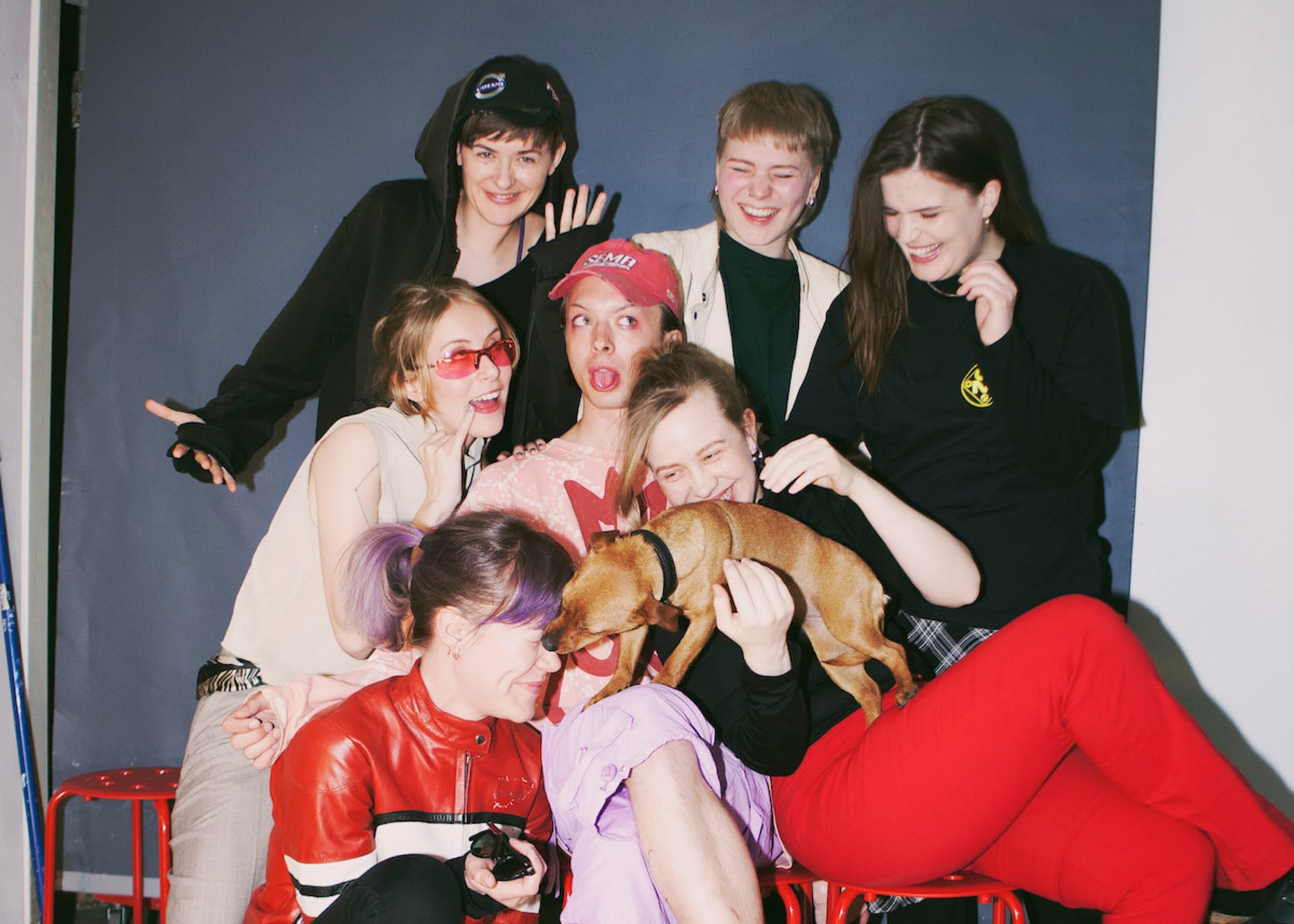
Meet Drömfakulteten, The Collective Behind Some Of Sweden’s Most Forward-Thinking New Music
Drömfakulteten is a female, trans and non-binary music collective based around a shared studio space in Stockholm. Though its 12 members explore different sounds, the works they produce are some of the most unique releases in electronic dance music today.
Unlike most other all-women music collectives, Drömfakulteten is anchored in a physical sense of place. Where its internet-savvy contemporaries congregate on private Facebook groups and Slack threads, this Stockholm, Sweden-based crew established an IRL community within a bike repair shop-turned-studio in the neighborhood of Södermalm.
The space, in the basement of an old housing complex and next to a pizzeria, is modest or “lo-fi” as the founder HAJ300 describes it. The concrete floors and thin walls of its interiors are not sound isolated or acoustically ideal. At times, cigarette smoke still hangs in the air several days post-after party due to the poor ventilation. But, like the over-stuffed couches and peeling wallpaper of a weathered family home, the Drömfakulteten studio’s imperfections are the very traits of familiarity and comfort conducive to expressive music making.
“No matter what kind of background or political view, I just wish everyone could have this kind of space,” says HAJ300, real name Katja Lindeberg. She and a selection of other members, including KABLAM, rip ME, Sissel Wincent and Sonja Tofik, pass a bottle of red wine between one another as we conduct our interview. (The collective also includes Juliann Julian, Linn Elisabet, Lisa Gagerman, Lois Nygren, Maria W Horn, MeiYáo, solo show and TMRW.)
It’s an overcast Thursday in February and everyone just returned from sound check around the corner at Berghain’s Säule dance floor, where they perform later that evening. In this hotel room off Warschauer Straße in Kreuzberg, aptly titled “the band,” lofted single beds cradled in blonde wood frames squeeze together above us. To the right of the entrance, rip ME applies winged black and pink eyeliner in front of the mirror.
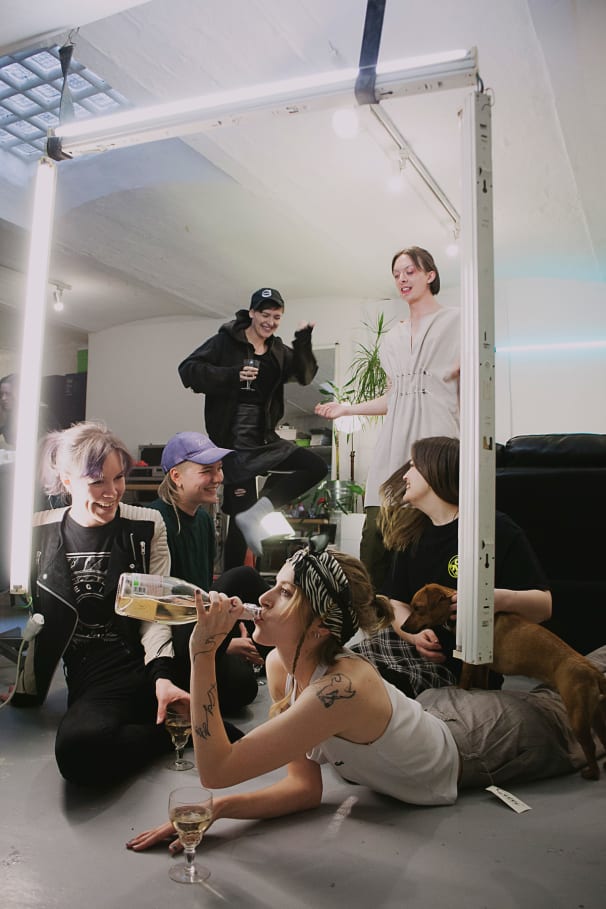
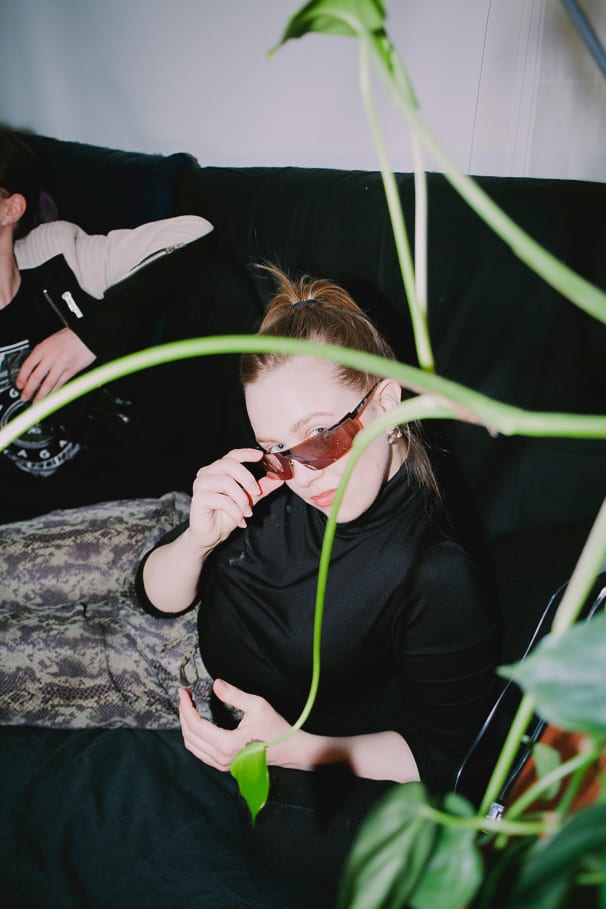
Drömfakulteten is unusual in many regards. They are not necessarily codified by a strong activist ethos or creative manifesto. Their name was not decided by consensus, but accepted as a well-worn hand-me-down from the art collective whose accommodations they also inherited. Their membership is constantly in flux and nebulously defined by those who can afford to pay rent. Its current eleven affiliates, who all loosely share an experimental approach to production, strengthen their bonds through interconnected studio rooms of their own. “A few years ago, we were more spread out genre-wise, but we’re a bit more coherent now because we influence each other,” Katja says, explaining their entwined growth.
Within these basement confines is where HAJ300 assembled the assets for her live set tonight; Sissel prepped for her techno-derivative EP Assorted Lights; and KABLAM labored over her new album Confusia, self-described as an attempt to “channel some feelings of confusion and chaos.” It is here where the members of Drömfakulteten compose their iconoclastic musical worlds, sequestered away from outside influence.
By loading the content from Bandcamp, you agree to Bandcamp's privacy policy.
Learn more
This, interestingly enough, includes the local scene in Stockholm. “More conservative,” is how Katja describes it. She says there is a lack of DIY spaces to truly cultivate underground club culture. In spite of compatriots like labels Staycore, Country Music and YEAR0001 that fortify the same pioneering approach to electronic music as Drömfakulteten, the city seems stuck in the past. “I think promoters here are very comfortable,” Katja states, “Festivals and more commercial clubs still book the same people that were popular five years ago.” Their crew tastes remain firm outliers from the larger nocturnal milieus, which is why they’ve chosen to turn inwards.
To this end, Drömfakulteten has evolved drastically from its untamed past. HAJ300 was a former member of the artists’ collective for two years and was, from the start, somewhat of a creative anomaly. She was the only one who did not hold a degree from one of Stockholm’s various art institutions. Unlike the others, she moved into the building in 2012 for the purpose of making music and running nights. “We had so many long, hectic parties because people weren’t working other jobs,” she says, as a blunt statement of fact. “We needed to make money, basically.”
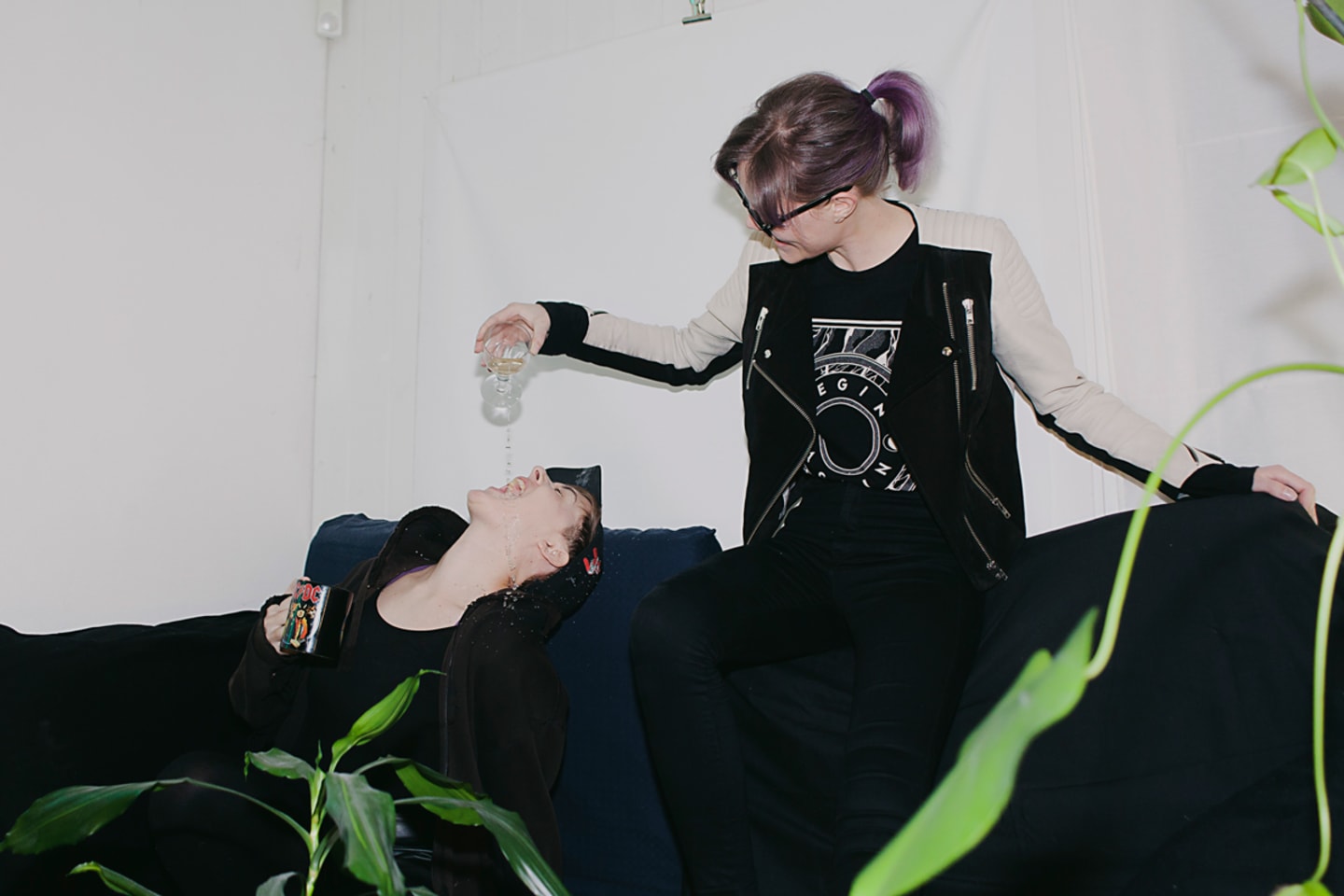
During our interview in February, Katja is soft-spoken, yet, as the founder, is naturally the most vocal of the group. Tall and blonde, she holds herself with a cool, Scandinavian reserve. She wears a pair of nondescript grey trousers with a black tank top. On her right arm is a large, slightly askew triangle tattoo, and a tiny braid hangs below her left ear. “It was hard for me back then because I was quite young,” she reflects. Twenty-year-old and impressionable at the time, Katja felt unmoored by the marathon hedonism that would sometimes stretch to five days a week. “I’ve been in that position where I’ve partied a lot and felt like I had a lot of really good friends,” she says, “But then I realized, when the weekend was off, you just have yourself.”
The newest iteration of Drömfakulteten, she insists, is the contrary to this. In 2014, she took over the contract, “threw everyone out,” and began looking for female, non-binary, and trans producers who had a similar penchant for warping the boundaries of club music. “When I thought about having a studio space with no dudes, I didn’t know anyone who would fit,” she says, “I had to lure people out who could be interested.” This time, parties became a practical gathering place to search for like-minded individuals. The first official event was in October 2014, followed by a series of synthesizer meet-ups.
“That’s how I got in,” Kajsa Blom, also known as KABLAM, pipes in. Sitting to my left, she sports silver hoop earrings and a red Panther’s jersey. She has a remarkably demure demeanor for someone whose music is so emotionally forthright. In October 2014, her friend invited her to one of Katja’s synthesizer workshops. Kajsa was producing solely on her laptop and had no previous experience with gear. Her curiosity and Drömfakulteten’s inclusivity to all skill levels eventually led to her membership. Sissel Wincent joined April 2015, Sonja Tofik in March 2016, and rip ME most recently in summer of 2016. The rest of their cohort falls some where along this timeline.

Sissel, who is club-ready in snakeskin pants, moves over when rip ME, real name Em Silén, finishes up their make up in the vanity mirror and takes a seat next to her in the circle. The bright yellow sweater they wear is approximately the same color as a fluorescent Post-it Note. We may be countries away from their basement studio in Södermalm, but the soft bursts laughter and atmosphere of gentle camaraderie hints at their dynamic back home. Drömfakulteten have group meetings at least once a month. After work, depending on who is free, they’ve been soldering modular synthesizers together. Sissel remembers one movie night where they pushed two Queen-sized beds in the common room and watched The Art of Mixing.
When I ask each of them about their current projects, other members are earnest to volunteer their own supportive descriptions. KABLAM, for instance, hesitates in explaining the sound of her Confusia album. “I thought raw…rhythmic… and sort of spidery,” rip ME offers up. “Creeping—kind of nasty?” Katja throws in. KABLAM laughs. “Spidery! I like that,” she says, “I’m going to use that next time.”
Then Sonja Tofik, a dark brunette who could easily pass as Wednesday Addams’ sweeter, more socially adjusted cousin, tells me she recently bought a mini organ and is planning to do some “cathedral-ish” production. “I don’t know how I would define it exactly,” she says. “Emotional!” Sissel adds. “And a bit lethargic. Would you say that?” asks rip ME.
“Of course we’re about the music we make,” says Em. They speak in low, hushed tones as if each word carries immeasurable weight. “But the moments I remember and are the most important to me have been when I just go [to the studio] and have lunch or sleep on the sofa or talk to somebody on the way out.”
In this era of bedroom producers, a communal space is an undeniable luxury. Electronic or club music is often made in complete isolation. This is perhaps a contributing factor to why the number of collectives has risen in the past few years, especially ones tailored towards femme, trans, non-binary and other marginalized individuals within the industry. A recent online survey conducted by Swedish digital distribution company Record Union found that 73% of the 1,500 independent artist participants have suffered from anxiety and depression. Loneliness, pressure to succeed, fear of failure and financial instability were among the major contributing factors.
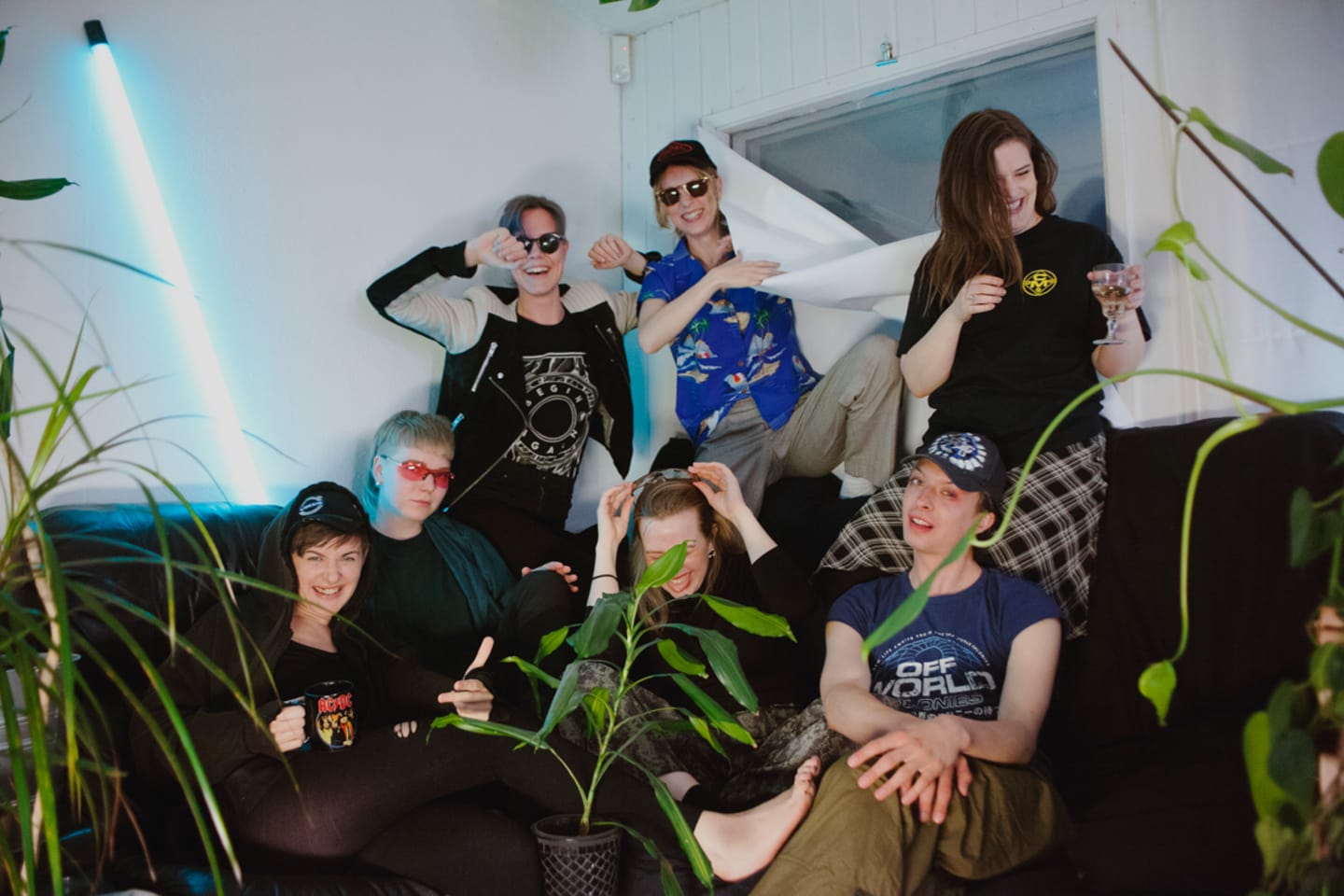
Rip ME and HAJ300 in particular consider Drömfakulteten a saving grace. In the past, it’s functioned as a sanctuary during the moments when mental health and personal adversity took their worst toll.
Em, who was afflicted two years ago by what they describe as a “perfectionist’s burn out mentality,” tells me the mounting pressure they felt was a product of their classical music background. Due to this, they “lived with a lot of ideas of what music should be or how you were supposed to play it.” Currently matriculating at the Royal College Of Music in Stockholm for electro-acoustic composition, Em took on a rigorous academic workload to push themselves towards “a very short-term productive state of mind.” Drömfakulteten catalyzed their ability to embrace mistakes in the creative process. “I feel like this collective has played a huge part in making me realize there is no right or wrong,” Em says. “This has also been a valuable space for me to understand that I am not my product. I am not the things that I produce.”
For HAJ300, the Drömfakulteten studio is a second home where compassion is unconditional and social support is an unspoken guarantee. “We are not besties who text each other every day. Rather, it’s more like a family where you haven’t really chosen the people, but you’re still very familiar, close, and super caring about one another,” Katja says. “It’s another kind of friendship.”
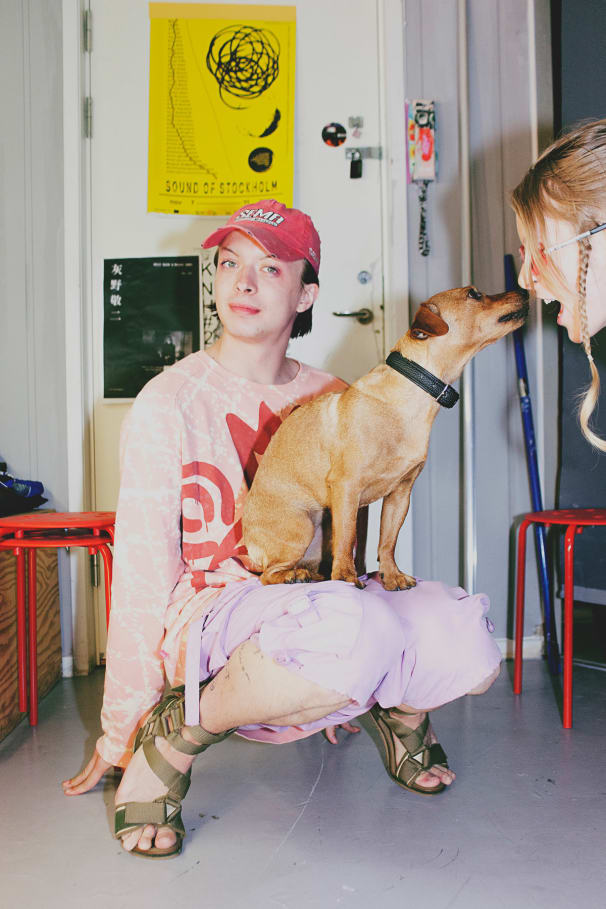
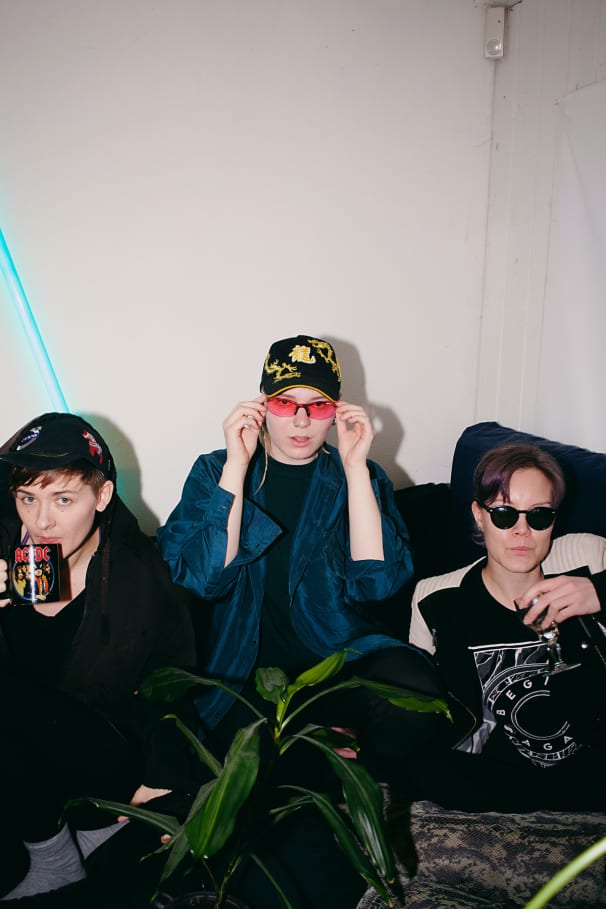
However, the importance of these spaces is not always upheld in a city that has been embroiled in a housing crisis for over 100 years. In a 500-word long Facebook post on June 28, written in both Swedish and English, Drömfakulteten announced the loss of their temporary lease due to basement renovations and declared Stockholm “a city in crisis.” Over email, Katja tells me, “We get the opportunity to start something new, maybe different. We don’t know yet.”
She also recognizes that they are not alone in this struggle as gentrification further disrupts the urban fabric. The queer bar and performance venue Bitter Pills, live concert venue Debaser, and Snotty Sounds Bar, which hosted indie rock nights, (“basically any place in the city that makes sound,” Katja says) are among the casualties in this fight. While the loss of the studio may be the loss of Drömfakulteten’s autonomy, the collective remains unified and cautiously optimistic.
“We know we have been a part of the change, trough [sic] club nights, concerts and long long debates online,” their online post reads. “We hope that our DIY attitude has rubbed of [sic] and encouraged others to dare a bit more.” Underneath their sign off, “Until next time, DRÖMFAKULTETEN 4EVER,” is a banner photo of an open highway through green pastures. Above, the road sign states in white cap letters, “HOPE: A1 Next Exit.”
At their February showcase at Säule, the audacity on which the collective prides itself is fully animated. Rings of light in radioactive green circle the venue’s concrete pillars as the intimate crowd sway below. Sissel Wincent’s DJ set jumps from rhythmic club stompers with glitching accents to wailing sirens between feverish underground techno with Qween Beat affiliate Ash B’s cunty ballroom track “Realness” thrown in for good measure. Rip ME favors the more sound collaged approach, as does HAJ300 for her live set. One track the former plays consists of “Dr. Jones” by Aqua combined with “Carry Out” by Timbaland and Justin Timberlake. This weaves into selections from a Final Fantasy soundtrack and a piece by Stravinsky—as a nod to their classically trained roots.
HAJ300 tells me her performance is somewhat dedicated to her friends in Berlin who have flocked to the front of the stage. During the set, she folds in-group references ripped from Youtube videos and cult status movies and shows like Die Hard and Twin Peaks between high-octane, distorted drums. She ends on a more placid note with a self-produced remix of Anna Ternheim’s cover of Broder Daniel’s Swedish emo anthem “Shoreline.” Soprano vocals, with the same clarity as HAJ300’s own voice, echoes lyrics of impermanence throughout the cavernous space: “I’ve been standing on the shoreline/ Always waiting/ For something lasting.”
Published August 28, 2019. Words by Whitney Wei, photos by Jona Alicia.
